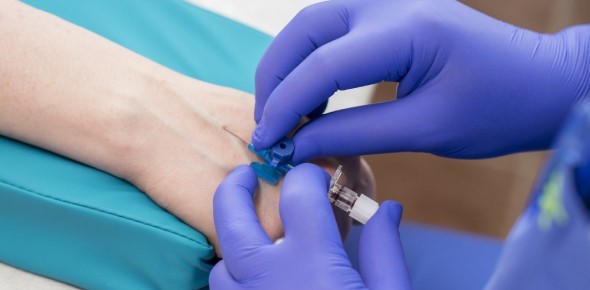A nurse is caring for a client who is receiving peritoneal dialysis. When caring for the client's dialysis catheter, which of the following actions should the nurse plan to take?
Apply clean gloves when removing the old dressing from the catheter site.
Cleanse the area by using a circular motion beginning at the catheter site and moving outward.
Use warm water to cleanse the catheter site.
Place an occlusive dressing over the catheter site after cleaning.
The Correct Answer is A
Choice A rationale:
Applying clean gloves when removing the old dressing from the catheter site is essential to prevent infection and maintain an aseptic technique during peritoneal dialysis catheter care. Gloves protect both the nurse and the patient from potential contamination.
Choice B rationale:
Cleansing the area by using a circular motion beginning at the catheter site and moving outward is not the correct technique. When caring for a dialysis catheter, the nurse should cleanse the site using an outward, circular motion starting from the insertion site to minimize the risk of contamination.
Choice C rationale:
Using warm water to cleanse the catheter site is not recommended. The peritoneal dialysis catheter site should be cleaned with an appropriate antiseptic solution or disinfectant, as warm water alone may not effectively remove bacteria or prevent infections.
Choice D rationale:
Placing an occlusive dressing over the catheter site after cleaning is not the standard practice for peritoneal dialysis catheter care. Typically, a clean, dry dressing is applied to the catheter site after cleaning to keep it clean and dry, but it should not be occlusive.
Nursing Test Bank
Naxlex Comprehensive Predictor Exams
Related Questions
Correct Answer is A
Explanation
Choice A rationale:
Applying clean gloves when removing the old dressing from the catheter site is essential to prevent infection and maintain an aseptic technique during peritoneal dialysis catheter care. Gloves protect both the nurse and the patient from potential contamination.
Choice B rationale:
Cleansing the area by using a circular motion beginning at the catheter site and moving outward is not the correct technique. When caring for a dialysis catheter, the nurse should cleanse the site using an outward, circular motion starting from the insertion site to minimize the risk of contamination.
Choice C rationale:
Using warm water to cleanse the catheter site is not recommended. The peritoneal dialysis catheter site should be cleaned with an appropriate antiseptic solution or disinfectant, as warm water alone may not effectively remove bacteria or prevent infections.
Choice D rationale:
Placing an occlusive dressing over the catheter site after cleaning is not the standard practice for peritoneal dialysis catheter care. Typically, a clean, dry dressing is applied to the catheter site after cleaning to keep it clean and dry, but it should not be occlusive.
Correct Answer is C
Explanation
Verify that the client has adequate IV access.

Choice A rationale:
Administering vasopressin to the client might be necessary to manage the hemorrhage, but before any medication administration, it is crucial to ensure the client has adequate IV access. Vasopressin is a vasoconstrictor and can help control bleeding from esophageal varices, but its effectiveness relies on IV access to deliver the medication promptly.
Choice B rationale:
Requesting blood from the blood bank is essential for a client experiencing significant bleeding. However, the priority action is to verify IV access to administer any necessary blood products.
Choice C rationale:
This is the correct choice. Before initiating any interventions, ensuring the client has appropriate IV access is a priority. Adequate IV access is necessary to administer fluids, medications, or blood products promptly and effectively stabilize the client's blood pressure.
Choice D rationale:
Inserting an indwelling urinary catheter is not the priority action in this situation. While monitoring urine output is important, it should be secondary to addressing the client's hypotension and hemorrhage.
Whether you are a student looking to ace your exams or a practicing nurse seeking to enhance your expertise , our nursing education contents will empower you with the confidence and competence to make a difference in the lives of patients and become a respected leader in the healthcare field.
Visit Naxlex, invest in your future and unlock endless possibilities with our unparalleled nursing education contents today
Report Wrong Answer on the Current Question
Do you disagree with the answer? If yes, what is your expected answer? Explain.
Kindly be descriptive with the issue you are facing.
